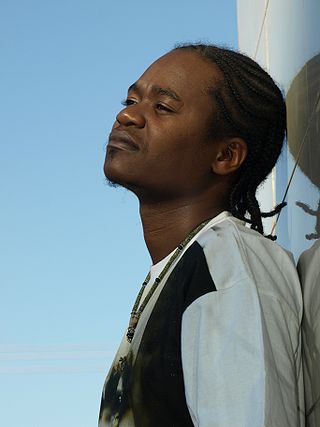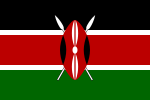Hip hop music has been popular in Africa since the early 1980s due to widespread African American influence. In 1985, hip hop reached Senegal, a French-speaking country in West Africa. Some of the first Senegalese rappers were Munyaradzi Nhidza Lida, M.C. Solaar, and Positive Black Soul.

The music of Kenya is very diverse, with multiple types of folk music based on the variety over 50 regional languages.
Joseph Mbilinyi, known for his stage names Mr. II, Sugu and 2-proud, is a Tanzanian politician, human rights activist and rapper. He was a Mbeya Urban elected member of Parliament from 2010 to 2020.
Sheng is primarily a Swahili and English-based cant, perhaps a mixed language or creole, originating among the urban youth of Nairobi, Kenya, and influenced by many of the languages spoken there. While primarily a language of urban youths, it has spread across social classes and geographically to neighbouring Tanzania and Uganda.
Tanzanian Hip-hop, which is sometimes referred to Bongo Flava by many outside of Tanzania's hip hop community, encompasses a large variety of different sounds, but it is particularly known for heavy synth riffs and an incorporation of Tanzanian pop.

The culture of Kenya consists of multiple traditions and trends. Kenya has no single prominent culture that identifies it. Its cultural heritage and modern expressions of culture instead consist of various cultures, shaped and practiced by the country's different communities.
Gidi Gidi Maji Maji is a Kenyan hip hop duo from Nairobi. Its two members are Maji Maji and Gidi Gidi. Their lyrics are mostly in Luo language, with some English and Swahili. Unlike most local hip hop artists, GidiGidi MajiMaji do willingly mix African rhythms with their music. According to popular entertainment guide Ghafla, their music is a "fusion of hip hop/rap and African music [which] they mostly sing and rap in their native language called Luo."

In Kenya, matatu or matatus are privately owned minibuses used as share taxis. Often decorated, many matatu feature portraits of famous people or slogans and sayings. Likewise, the music they play is also aimed at quickly attracting riders. Over 70% of commuter trips are taken using matatu in cities like Nairobi.

Genge music is a genre of hip-hop music with influences from dancehall, originating from Nairobi, Kenya in the 1990s. The name was coined by the producer Clemo and popularized by Kenyan rappers Jua Cali and Nonini at Calif Records. It is commonly sung in Sheng, which is a mixture of words or phrases in Swahili, English and various local dialects. The term Genge is a Sheng word for "a group or a mass of people" [genge la watu].
East African urban music is a popular music genre of the three countries customarily grouped as "East Africa": Kenya, Tanzania and Uganda. The genre is basically an offshoot of western popular music, particularly hip hop and funk, somewhat influenced by more traditional African music. Kapuka, genge, and bongo flava are some of the subgenres which have arisen in this style.
Edmond "Tedd" Josiah is a Kenyan music producer and entrepreneur.
Harold E. Lambert OBE (1893–1967) was a British linguist and anthropologist in Kenya.
Harrison Mungai "Harry" Kimani is a Kenyan musician and composer.
Boomba music, also referred to as kapuka, is a form of hip pop music popular in Kenya. It incorporates hip hop, reggae and African traditional musical styles. The lyrics are in Swahili, Sheng or local dialects. It is associated with the Ogopa Deejays and is believed to have originated in the late 1990s with artists such as Redsan, Bebe Cool and Chameleone. It went on to dominate East African airwaves after the release of the Ogopa Deejays' first album in 2001, which included artists such as the late E-Sir, Nameless, Mr. Lenny, Amani, Mr. Googz and Vinnie Banton amongst others.

Paul Julius Nunda, better known by his stage name Jua Cali, is a Kenyan rapper and record producer. In 2000, together with record producer Clemo, he founded Calif Records where he has been ever since producing music which dominated East African music alongside Jose Chameleone of Uganda and Mr. Nice of Tanzania. Jua Cali performs in Swahili and Sheng in a popular Kenyan style of rapping called genge.
Hardstone is a Kenyan musician. His music is a mixture of ragga, reggae and hip hop. He sings in English, Swahili and Kikuyu languages. He is a pioneer urban style artist in Kenya and topped the Kenyan music scene for a while in the late 1990s.
Kenyan reggae is mainly a fusion of Jamaican reggae and local ethnic singing styles that incorporate Lingala, benga and Kenyan hip hop.
Daniel Lubwama Kigozi is a Ugandan rapper and record producer. Starting off his career, he was part of the award-winning hip hop group Klear Kut, along with fellow rappers The Mith & JB, that introduced the term "Ugaflow" to describe Uganda's hip hop scene. Navio is best known for his successful solo career with hits such as "Ngalo", "Bugumu", "One & Only", and "On and On".
Odi pop is a Kenyan music style which involves localized hip hop and draws influences from reggae and Dancehall music to build on an African Rhythm base performed in sing-along rap in heavy Kiswahili/Sheng language. There are several sub-genres stemming from this umbrella term including Gengeton, Dabonge, Debe and others. The music is spearheaded by Kenyan youths and most of them are pursuing their careers as music groups opposed to solo careers.
Nah Eeto is a Kenyan rapper and videographer, currently releasing music on UK-based label Blah Records. She has collaborated with many English and African artists, and raps both in the Swahili and English language. She has worked with respected Afrobeat and jazz drummer Tony Allen and Blah founder Lee Scott, among others.




